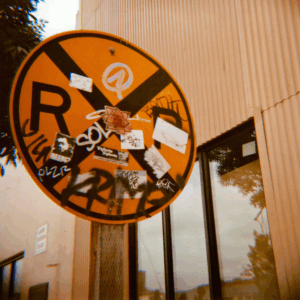
After shooting some 25,000 digital photos in the last decade and a half, I finally did something I never thought I would: I started shooting film again.
In a fit of boredom, I bought a Lomography Diana F+ camera. It’s a 40-buck plastic toy camera that shoots 120 roll film, with manual everything and a plastic lens that takes hipster-esque Instagram-y pictures. I took it out and ran three rolls through it, just to see what it would be like. It was tough, clunky, and awkward, but I loved it.
I haven’t shot film since 2000. I got my first digital camera, a 1-MP Olympus point/shoot, at J&R Electronics in New York at the very end of that year. I remember this well, because I had to take a bunch of use-it-or-lose-it vacation and essentially split work very early in the month of December for the rest of the year, and I got really sick on the first day off. I spent the whole vacation in a NyQuil daze, sleeping for 30 hours, waking up in the middle of the night to order hot and sour soup by the gallon from the crap Chinese place down the street, then going back to bed. I eventually got ambulatory enough on the day after Christmas to brave a snowstorm that dumped a few feet of fluffy white snow over the island. I took the N train down to the City Hall stop to go into the electronics superstore that stood near the foot of the mighty twin towers of the World Trade Center. I bought the camera, stumbled home, and took a bunch of shots of my kitchen and bathroom, amazed at how they instantly showed up in the tiny LCD screen.
Digital changed my life. I didn’t have to go to labs, didn’t have to wait to see if a shot worked, and didn’t have the nagging self-censorship that a flunkie working the film counter at Osco’s would be looking at my prints. I took a ton of pictures with that little junk camera, and then moved on to a series of better point/shoots through the 00s before graduating to a DSLR in 2010. I love shooting with the big Canon, but I still take more pictures with my iPhone. Both are fast, easy, and cheap.
But, there’s a disconnect. I average a few hundred shots a month, although it’s in fits and spurts; I will take out the DSLR for vacation or a baseball game and run a few thousand shots, but then it goes back to the shelf; the iPhone grabs a funny picture or something interesting maybe a few times a week, mostly snapshots of the cats or stupid products in stores. Sometimes these go to flickr, endless galleries of vacation shots that nobody looks at. Hell, I don’t look at them half the time. I enjoy going back to remember something from ten years ago, but my least favorite part about vacation is trimming a thousand pictures down to a hundred and trying to caption them. I wish there was a program that would do it automatically, as I’ve said before, but that’s a ways off.
I think that disconnect between us and what we capture, the intermediary of the digital screen and the promise of quick/easy/cheap causes us to produce things we don’t care about. I don’t give a shit about most of those 25,000 shots I have in Aperture. Maybe 100 are really good works of art, and maybe 1000 of them are things I want to remember. And everyone is that way. Everyone with a digital camera has a million shots and nowhere to put them. And nobody likes looking at them, except people you don’t want prying into them, like stalkers and annoying relatives. Nobody creates with a camera anymore; we capture, hoping it will help us remember what we quickly forget in our fast-paced world, but we never go back to look at it, and none of it matters. It’s something we feel we should do, like when people take a thousand pictures an hour when they have kids, but nobody’s going to cherish those pictures. They’re probably going to be gone in a dozen years, from a dead hard drive or some new change to formats that will make them all obsolete.
So the first reaction from anyone I told about this new camera is “why the hell are you shooting film? Don’t you have an iPhone?” And the answer is that the lack of immediacy, the fact that I need to think because each shot is costing me a buck and I won’t see it for two weeks, makes me more cognizant of what I’m doing. It gives me more of a relationship with what I’m creating. I mean, my iPhone is still taking better pictures, but there’s something about the process of going to the photo shop and talking to the clerk and being handed that envelope of prints and negatives, and then the surprise of opening it and going through to see what worked and what didn’t. I enjoy the process, even if it takes longer.
It reminds me of the days of going to a real record store, talking to the people there about what’s new and what’s cool, flipping through the stacks, looking at the artwork, smelling the vinyl in the air and seeing the other people there. The whole ritual of going there is something I painfully miss, and buying albums made me more aware of them. It’s damn convenient to go to iTunes, listen to a few samples, and click the buy button to instantly have it on your computer. But I buy stuff and don’t even listen to it, forget about it, and have to force myself to use playlists and rate things to find them and get into them. I’m not aware of the music I have anymore.
It’s also the same with books. Everyone is into the Kindle, and I sell more ebooks than paper these days. But I download Kindle books that go free, or things I see online, and I never, ever read them. I have hundreds of Kindle books I will never in a million years open. I read 100% of everything on paper, and I love collecting books. I cherish the print copies of things I really dig, and nothing beats the hypnotic experience of holding a dead tree in your hands and flipping through the pages. Yes, it’s easier to search through a tech manual or textbook and find what you need on a Kindle or in a PDF. But the relationship between the reader and the work is much more solid on paper. Will the Kindle disrupt publishing? Sure. The CD disrupted the production of vinyl. But people who love music are back to buying it. Books are the same thing.
Anyway, the first film came out okay. It’s going to take some practice to get into it, and I probably need a cheaper 35mm to do some learning. Here are the first shots. It’s a fun distraction, so I’m going to keep at it. I’m still shooting as much or even more digital, but there’s just something about analog I can’t shake.



